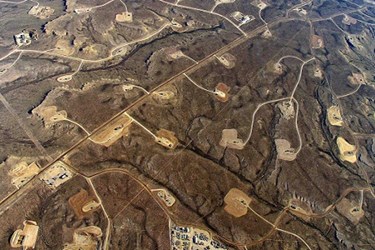EPA Finds Holes In Fracking Cocktail Data
A new government report indicates that an oil-and-gas industry database designed to bring transparency to the controversial practice of fracking fails to present a complete picture of where companies get their water and which chemicals they use.
"The project database is an incomplete picture of all hydraulic fracturing due to the voluntary reporting in some states for certain time periods (in the absence of state reporting requirements), the omission of information on confidential business information (CBI) ingredients from disclosures, and invalid or erroneous information created during the development of the database or found in the original disclosures," according to the report.
The government report, released last month by the EPA, homed in on the pros and cons of the database FracFocus, which aims to shed light on fracking practices that have long been criticized as dangerous to the water supply. The site is industry-backed and states that it is used by energy companies to "provide the public access to reported chemicals used for hydraulic fracturing within their area" and by some state regulators for oversight purposes. The EPA study focused on FracFocus entries over two years, starting in 2011.
"FracFocus has gained new importance because a rule for fracking on federal lands, released [last] month, requires drillers to use it to inform the public about the chemical ingredients. Environmental groups complain that the site is cumbersome and gives companies too much leeway to claim confidentiality," Bloomberg reported in an analysis of the EPA's findings.
Oil and gas companies have fought against pressure to release a complete list of chemicals used in their fracking cocktail. "Seventy percent of the disclosures analyzed included at least one ingredient that was claimed to be confidential business information (CBI), and 11% of the ingredient records were identified as CBI," according to the EPA report.
"Drilling-service companies say they should, for competitive reasons, be permitted to keep some of their recipe and ingredients secret," Bloomberg reported.
The EPA report also indicates that FracFocus does not provide a full picture of where companies get their water.
"Information related to water sources was reported in 29% of the disclosures. Some of these terms indicate a condition of water quality, such as “fresh,” rather than a specific identification of the source of the water such as ground water or surface water. The most commonly reported source of water used for base fluid was listed as “fresh” (68% of disclosures with water source information)," according to the report.
Environmentalists raised concerns about the EPA findings.
"The EPA report reminds us that there are still too many unanswered questions about the chemicals being used in communities around the country," according to Matthew McFeeley of the Natural Resources Defense Council.
When the government handed down new rules last month for companies fracking on public lands, the move immediately prompted a backlash from the energy industry and Republicans in Congress, who "introduced legislation to block them from taking effect," Politico reported.
The Independent Petroleum Association of America (IPAA) and Western Energy Alliance filed a lawsuit against the federal government. Opponents stressed the potential economic impact of the rules.
“These so-called baseline standards will threaten America’s economic upturn, while further deterring energy development on federal lands," said Barry Russell, President and CEO of the Independent Petroleum Association of America, per a statement.
The oil-and-gas industry maintains that fracking is not a threat to the water supply. Some research suggests that fracking can be done without threatening the water supply.
For more on produced water, visit Water Online's Produced Water Solution Center.
Image credit: “Fracking," © 2006 Simon Fraser University – University Communications’s stream, used under an Attribution 2.0 Generic license: http://creativecommons.org/licenses/by/2.0/
Copyright © 1996 - 2015, VertMarkets, Inc. All rights reserved. To subscribe or visit go to: http://www.wateronline.com
http://www.wateronline.com/doc/epa-finds-holes-in-fracking-cocktail-data-0001
